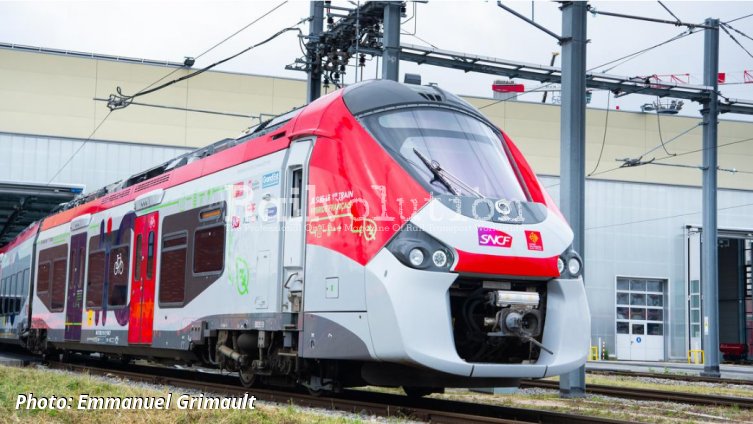Successful tests for the first regional hybrid train in France
posted on 22nd Jun 2023 09:26
The first hybrid electric-diesel-battery regional train underwent its first tests at the beginning of April on the Toulouse - Mazamet and Toulouse - Rodez lines in the south of France. The aim was to observe how the hybrid train performs on real line profiles and in real conditions according to the timetable of a commercial service. At the end of this test phase, on 14 June, this train was presented at the Occitanie Technicentre by Jean-Luc Gibelin, Vice-President of the Occitanie Region with responsibility for Mobility and Transport Infrastructure, Philippe Bru, Regional Director of SNCF Voyageurs Occitanie, and Kaïs Albouchi, Director of the Régiolis Hybrid and Hydrogen Projects at Alstom. Commercial service will begin in a few months, as soon as the Etablissement Public de Sécurité Ferroviaire (EPSF) has issued the necessary authorisations for passenger transport.
This BDEMU is the first hybridisation project for a Régiolis train in France. It was launched in 2018 by the SNCF Group and Alstom, with the mobilisation and financial participation of four French Regions (Occitanie, Grand Est, Nouvelle-Aquitaine, and Centre-Val de Loire), and the provision by the Occitanie Region of a trainset from its liO fleet. Along with the battery-powered train and the hydrogen train, the hybrid train is one of the three decarbonisation technologies that the SNCF Group is developing with its partners Alstom, CAF, and the French Regions for passenger transport on non-electrified or partially electrified regional lines.
France’s first regional train to use batteries for propulsion
Hybridization of the Régiolis unit involved replacing half of the diesel engines with energy storage systems consisting of lithium-ion batteries. This operation was carried out at the beginning of 2021 at the CAF site in Reichshoffen (until August 2022 owned by Alstom), following an initial validation phase for the new energy storage systems at the end of 2020 at the Alstom site in Tarbes. One car of the train has also been temporarily fitted with a laboratory and multiple sensors to measure the train’s energy flows.
Equipped with its two energy storage systems and its laboratory car, the units has started its tests in the second half of 2021. A static and dynamic fine-tuning phase at up to 60 km/h took place at Reichshoffen to check the train’s operation and test the hybrid traction mode. Tests then continued on the Velim test circuit in the Czech Republic, with validation and certification tests at up to 160 km/h. This enabled all the train’s new traction modes to be tested at their operating speed, and the route simulation models to be validated.
First positive feedbacks
The tests showed that the train performed as expected. The braking energy recovery rate, used to recharge the batteries, is very high, at over 90 %, enabling energy savings of up to 20 %, depending on the route. The zero-emission battery-powered mode is designed to power the train for a few kilometres without the need to use diesel engines. On non-electrified lines, the Régiolis BDEMU retains the range of the initial model for up to 1,000 km.
Next steps
With the final tests on the national rail network having taken place in April, SNCF Voyageurs has now to submit the admission file to the EPSF with a view to obtaining the necessary authorisations for its commercial operation. SNCF Voyageurs will also use this period to prepare for the launch of the trainset in the various regions (timetable plan, staff training, etc.).
The start of the experimental commercial service is scheduled for the end of 2023 in Occitanie, particularly on the Mazamet - Toulouse and Rodez - Toulouse lines. The modified trainset will then run throughout 2024 in the Nouvelle-Aquitaine, Grand Est, and Centre-Val de Loire regions.
The industrial deployment of the hybridisation solution on other dual-mode Régiolises still needs to be specified, and could begin as soon as the Regions, the organising authorities for regional passenger transport, decide to do so. Funding:
- SNCF and Alstom each contributing 3.8 million EUR,
- The Occitanie, Nouvelle-Aquitaine and Grand Est regions, each contributing 3 million EUR,
- 250,000 EUR from the Centre Val de Loire Region,
giving a total budget of 16,85 million EUR.
Philippe Bru, Regional Director of SNCF Voyageurs Occitanie, said: “We are very proud to welcome to Occitanie the first hybrid train from the liO fleet to run on the Toulouse-Mazamet and Toulouse-Rodez lines. The skills of the SNCF and Alstom technical teams have made it possible to meet the challenge of integrating an innovative traction system into an existing rolling stock, thus paving the way for the decarbonisation of regional trains. As part of the 2023-2032 agreement, SNCF Voyageurs and the Occitanie Region have set themselves the ambitious target of reducing CO2 emissions per passenger kilometre by 40%. With the first hybrid regional train, Occitanie is the only region involved in all the trials of innovative rolling stock to reduce CO2 emissions, efficiently and quickly”.
We asked Alstom (two times) for more precise technical data of the modified Régiolis, but the company did not answer us.

